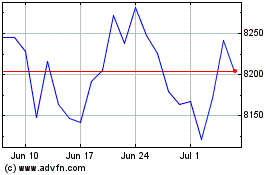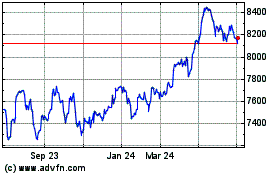Global Stocks Slide on Manufacturing Slowdown
October 02 2019 - 8:30AM
Dow Jones News
By Max Bernhard
-- European and Asian stocks lower
-- Industrial stocks lead the drop
-- Investors await ADP Jobs data
Global stocks fell Wednesday, led by drops in industrial
companies as investors expressed increasing worries about an
economic slowdown.
The Stoxx Europe 600 was down 1.6%, with Germany's DAX 1.4%
lower and the U.K.'s FTSE 100 down 2.1%. In the U.S., S&P 500
futures were down 0.6%.
Markets continued to react to disappointing economic data.
Germany's leading economics research institutes jointly lowered
their growth forecasts Wednesday for Europe's largest economy. They
cited slowing global demand for capital goods, structural changes
in the auto sector -- one of Germany's most important industries --
and political uncertainty. That followed Tuesday's figures showing
manufacturing activity in the U.S. was at its lowest point in a
decade in the U.S.
Steel giant ArcelorMittal and Finnish construction machinery
maker Konecranes were both among the biggest losers in Europe,
falling 3.8% and 4% respectively.
"There hasn't been a single month this year where Germany has
seen expansion in its manufacturing sector," said Michael Hewson,
chief market analyst at CMC Markets, who expects the weakness in
manufacturing to spill over into the services sector.
If the manufacturing slowdown spreads to the still robust
service sector, this would increase pressure on the Federal Reserve
to cut rates again in October, said Stefan Schilbe, HSBC Germany's
chief economist.
Among individual stocks, shares in U.K. bookmaking business
Flutter Entertainment rose 17% after it agreed to merge with Stars
Group, creating an online betting giant worth more than $11
billion.
U.K. stocks overall were among the hardest hit in Europe. That
was despite a weaker pound, which usually benefits FTSE 100 listed
companies, many of which derive a majority of their earnings
abroad. The pound fell 0.4% to $1.226.
Prime Minister Boris Johnson presented his latest Brexit
proposal and warned he is still prepared to take the U.K. out of
the EU at the end of October without a deal.
The FTSE 100's decline was driven by mining and oil companies as
well as the construction sector, said Chris Beauchamp, chief market
analyst at IG. U.K. construction activity data dropped in
September, a slowdown which survey respondents attributed to
uncertainty over Brexit. Miners Antafogasta PLC and Rio Tinto
traded down 4.3% and 3.5%, respectively.
European luxury-goods stocks traded lower ahead of an expected
World Trade Organization ruling on the extent of tariffs the U.S.
would be allowed to impose on some European goods, including luxury
items and airplanesLVMH traded 2.2% lower, Burberry and Kering each
traded 3% lower.
Bank stocks in Europe fell, with the Stoxx Europe 600 Banks
index down 1.2%, reflecting unease about falling bond yields, which
crimp lender profits. Banks' performance is also seen as highly
correlated with economic growth. Swiss bank UBS Group was down
1.7%.
In Asia, Korea's Kospi was down nearly 2% following news that
North Korea fired at least one missile off its east coast. The
move, seen as a show of strength, came after Pyongyang said it
would resume official nuclear talks with the U.S. In Japan, the
Nikkei fell 0.5% and Hong Kong's Hang Seng was down 0.2%. Mainland
Chinese stock markets were closed for a holiday.
In commodities, Brent crude fell 0.3% to $58.75 a barrel.
The yield on U.S. 10-year Treasurys was slightly lower at
1.625%, from 1.638% Tuesday. Bond yields and prices move in
opposite directions.
Looking ahead, investors will eye the ADP National Employment
Report for signs of any cracks in the U.S. job market. Plus, Ford
Motor Co. will report third-quarter sales.
Write to Max Bernhard at Max.Bernhard@dowjones.com
(END) Dow Jones Newswires
October 02, 2019 08:15 ET (12:15 GMT)
Copyright (c) 2019 Dow Jones & Company, Inc.
FTSE 100
Index Chart
From Mar 2024 to Apr 2024

FTSE 100
Index Chart
From Apr 2023 to Apr 2024
